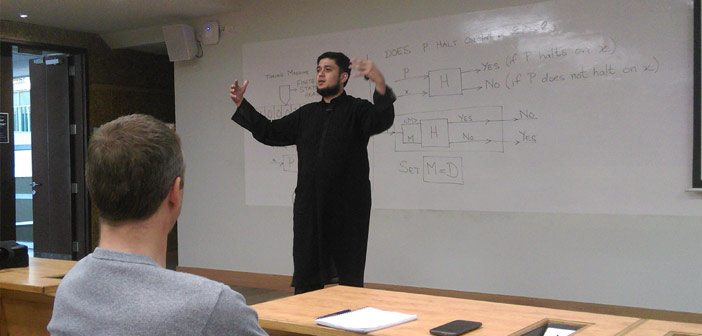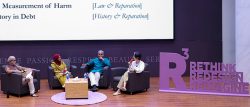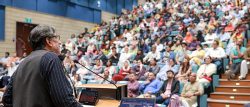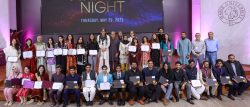November 5, 2015
HABIB UNIVERSITY: A public seminar titled ‘Is Human Intelligence Physical’ was organized by the School of Science and Engineering here at the Rashid Soorty & Family Lecture Theater to examine the possibility of machines that can think like human beings. Dr. Jibran Rashid, Assistant Professor of Computer Science at Habib, delivered a well-received lecture on Human and Artificial Intelligence to an audience comprising Habib students, faculty, and the general public.
Dr. Rashid’s talk was a follow-up of ‘AI: Can Human Intelligence Be Simulated’ – a lecture delivered by IBA computer science faculty member Mr. Ahmed Raza on October 20, 2015. Mr. Raza had based his rebuttal of the idea of simulating human intelligence on arguments made by renowned English physicist and philosopher of science, Sir Roger Penrose.
Dr. Rashid, who became interested in human intelligence and the physical world during his study of quantum computing while at university, deconstructed the assumptions underpinning Mr. Raza’s theory. He started by broadly restating Penrose’s argument – that there exist physical processes in nature that cannot be simulated by an algorithm on a Turing Machine – and turned it on its head by asking whether such physical processes even exist; and if they do, aren’t their mere identification a physical process that can lead to their computation?
He then moved on to question what we even mean when we say that intelligence cannot be simulated: are we saying that a specific human intelligence that has all the resources of nature at its disposal cannot be simulated, or that any kind of intelligence cannot be simulated? (here, Dr. Rashid used biologists, dolphins, and amoeba to comic effect to illustrate his point).
Dr. Rashid concluded his lecture by repositioning what was at stake: he argued that a more pragmatic approach to the problem of simulating human intelligence is to consider whether the computational complexity of such a process can be determined. He cited the advances human beings have made in creating machines that regularly beat chess grandmasters at their games. Admitting that simulating the human mind is no mean feat, one that may require technology carefully orchestrating complex quantum behavior; he nonetheless considers it in principle to be doable.
The talk, irresistible as it was in the kind of questions it kept throwing up about human intelligence and nature, was followed by an intense Q&A session with the audience. One observer asked Dr. Rashid what his position implied for the creative arts: would humans ever be able to write code that could simulate Shakespeare, Beethoven, or Mozart? In general, the attendees seemed reluctant to let go of the notion that the human mind is transcendent to reality. Dr. Rashid said it may be possible to do it – if we figure out the complex processes that went on in Beethoven’s or Shakespeare’s minds in the run-up to creating their works of art.
Dr. Rashid’s insights into the nature of human intelligence were a testament to the innovative thinking nurtured at Habib University, a place where groundbreaking ideas are explored, making it one of the best universities in Pakistan. His exploration of the similarities between human intelligence and artificial intelligence and the difference between artificial intelligence and human intelligence showcases the university’s commitment to advancing knowledge in this field. Furthermore, the seminar also addressed artificial intelligence and the future of humans, asking important questions about artificial intelligence and human thinking and considering the difference between human and artificial intelligence.




